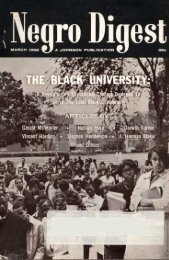3. Strain, Christopher Barry. “Civil Rights and ... - Freedom Archives
3. Strain, Christopher Barry. “Civil Rights and ... - Freedom Archives
3. Strain, Christopher Barry. “Civil Rights and ... - Freedom Archives
Create successful ePaper yourself
Turn your PDF publications into a flip-book with our unique Google optimized e-Paper software.
mayhem, televised before a national audience, prompted not only desegregation in<br />
Birmingham but also a wave of national sympathy, <strong>and</strong> a rash of similar protests across the<br />
South . The civil rights movement climaxed on August 28, 1%3, when a quarter million<br />
people participated in the Mac+ch on Washington, where King delivered his famous "I Have a<br />
Dream" speech .<br />
The victory of Birmingham was short-lived. Less than three weeks later, on<br />
September 15, 1%3, someone bombed the Sixteenth Street Baptist Church in Birmingham .<br />
The explosion killed four black girls . Many saw the bombing as an end to the nonviolent<br />
phase of the movement. As King prepared to deliver the eulogy at a joint funeral service for<br />
the little girls, novelist John Killens alluded that this tragedy marked the end of nonviolence<br />
in the movement . "Negroes must be prepared to protect themselves with guns," he said .u<br />
Malcolm X agreed . He first went on record as a naysayer of nonviolent direct action<br />
in the spring of 1%3, when he accused Dr. Martin Luther King, Jr. of "disarming" southern<br />
blacks in their struggle for rights . Two television interviews-one with Dr. Kenneth Clark,<br />
one with James Baldwin~onfirmed his thoughts on nonviolence in the civil rights<br />
movement. "King is the best weapon that the white man, who wants to brutalize Negroes,<br />
has ever gotten in this country," he told Clark, "because he is setting up a situation where,<br />
when the white man wants to attack Negroes, they can't defend themselves:' Malcolm<br />
denounced King in the wake of the Birmingham protests, when many protestors were injured.<br />
uKillens, quoted in Corctta Scott King, 1]1y Life With Martin Luther KinJr. (New<br />
York: Holt, Rinehart, <strong>and</strong> Winston, 1%9), 226 .<br />
Malcolm X, interview by Kenneth B. Clark, June, 1%3, reprinted in John Henrik<br />
Clarke, Malcolm X: The Man <strong>and</strong> Ids Times (New York: Collier Books, 1969), 168-181 ; see<br />
also "Malcolm X Disputes Nonviolence Policy;' New York Times (June S,1%3) : 29.<br />
9~4
















